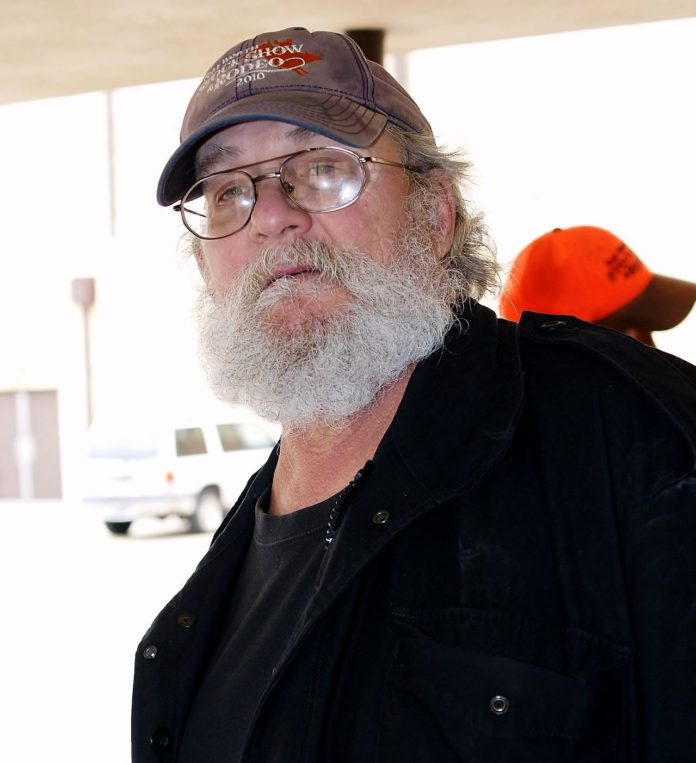Working, it’s what you do if you’re among several thousand folk, while having fun and reuniting with friends, at the 23-day Fort Worth Stock Show & Rodeo.
“I’ve grown up coming out here,” said Aledo-area resident Michele Kelly, now in her third year as a Stock Show temporary working cattle-area duties around West Arena. “It’s in my blood.”
Like many Stock Show & Rodeo workers, volunteers and participants, Kelly once showed livestock here, when she was growing up. She’s been around livestock all her life; her father is a veteran team-roper; he has competed here in this team version of rodeo calf roping. So, Kelly spends much of her time here helping exhibitors herd and stall their cattle.
No one can give a precise 23-day tally of all the people – from Stock Show & Rodeo hired hands and volunteers to livestock breeders, show executives, show exhibitors, cowboys, on-duty city police officers, commercial exhibitors/vendors, auction bidders and concessions stands staffers – who work on the grounds and parking lots. It likely tops 30,000, probably 40,000 and maybe 50,000, based on various show-related data.
Here are some known perspectives:
Stock Show & Rodeo President and General Manager Bradford “Brad” S. Barnes now rides herd on a stalwart core of personnel — including 20 year-round employees, 994 part-time and seasonal employees and about 950 volunteers.
Jobs range from accounting (full-time and seasonal), parking lot gate-keeping, first-aid/medical care, security (including off-duty and on-duty police officers), feed delivery, social media managing and graphics designing, the horse and livestock division managers, arena helpers and maintenance/cleanup (both enlisted city and seasonal help), said Matt Brockman, Stock Show publicity manager.
“During the show we turn the facilities over three times,” Brockman said, meaning supervising and helping three waves of exhibitors’ animals moving in and out, cleaning arenas and barns and pathways, re-bedding stalls and delivering feed, among other chores.
For the 2015 show/rodeo run alone, the staff payroll came to about $2.33 million; the wages and salaries paid for the 12 months prior to that 23-day event came to nearly $2.3 million, according to an economic impact report by Grotta Marketing Research of Fort Worth.
Those data don’t cover all show/rodeo-stint workers, including some city workers on regular duty in Will Rogers Memorial Center or the employees of the contract carnival vendor, the garbage/waste removal contractor, other contractors and commercial exhibitors.
“I also need the work,” Kelly said. She was echoing many of the 994 seasonal part-timers, often being paid $7.50 an hour for inside jobs and $7.75 an hour for outside work here.
For 11-year veteran show worker Charley Buie, this year’s stint will help pay bills as he’s between trucking jobs. From his station at a midway-area booth, the Eagle Mountain Lake-area resident directs show participants towing horse trailers in the John Justin Arena area.
“I’ve always wanted to work here,” said Fort Worth-area resident Damarius Richardson, a second-year show worker. For him, the part-time work here makes him, temporarily, a full-time wage earner by supplementing his regular part-time job nearby. “I love animals,” he added.
“This is my first year working out here,” said Azle-area resident Rachael Desrosiers, noting that she came out at the suggestion of a neighbor who works the show annually.
At one of Barnes’ annual pre-show orientations for temporary/seasonal workers, who are deployed in various operating departments, show officials praised the workers for being a key reason for its reputation statewide for being “visitor-friendly.”
Barnes said the grounds/gate workers are critical to show success; they’re typically the show first-contacts for most participants and guests.
Show administrative manager Dana Lewis encouraged the workers to continue watching for any hazards. “And take care of yourself,” she said.
The workers interviewed for this story all agreed that reuniting with friends, often seen only at the show or rodeo, is one key factor drawing them back.
“That’s the beauty of the show,” said Blair Norman, the 2016-2017 chairman of the Fort Worth Stock Show Syndicate, referring to the pleasures of seeing friends and making new ones here. Syndicate members work year-long to round up contributors to support the bidding for youngsters selling their market steers, hogs, lambs and goats at the Stock Show Junior Sale of Champions.
Got a story idea about the Stock Show? Email Worth Wren Jr. at wrensly4@att.net






